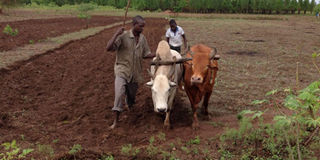Government fails to implement half of NDP II projects

Government had planned to modernise agriculture under NDP II. However, the sector is still dominated by agrarian activities. FILE PHOTO
Kampala- At least 50 per cent or half of government’s planned projects will not be completed by the end of the National Development Plan II (NDP II), according to the Office of the President.
NDP II, which has been running since 2015 will be ending by June 30, 2020 and will mark the launch of the third phase of National Development Plan.
A study conducted by the Office of the President to assess progress of NDP II projects indicates that slow implementation of projects by government agencies has continued to pose a big challenge for the achievement of middle income status as it had been envisaged by 2020.
Mr Vincent B Tumusiime, the director social economic monitoring and research at the Office of the President, said during presentation of findings in Kampala early this week that according to the mid-term evaluation report of NDP II, about 50 per cent of the planned development projects are not likely to be completed by 2020.
“Our findings indicate that despite several reforms and recommendations for improved implementation of investment projects, the same implementation challenges have persisted,” he said, noting that challenges such as project design, cost and time over-runs due to lengthy approval processes, corruption and ineffective coordination continue to stall implementation of projects.
The findings are contained in report commissioned by the President under the Apex Platform, which seeks to help government solve some of the policy challenges affecting economic development in the country.
The report also found that majority of the projects were politically driven thus limiting the impact on local communities.
Going forward, Mr Tumusiime said, all projects to be established should have elements of demand intervention other than supply intervention.”
The Apex Platform is an executive platform for collaborative learning, uptake and utilisation of evidence from technical reviews of government performance, independent studies and evaluations.
The platform is composed of the Office of the Prime Minister, Ministry of Finance, National Planning Authority and the Office of the President.
These will provide reports to the President’s Office offering independent oversight reports that incorporate the views and recommendations of non-state actors.
The Office of the President will then make a report on the lessons leant and what needs to be done to improve utilisation of recommendations and results.
Mr Tumusiime said the Apex Platform seeks to facilitate utilisation of evidence based action- focused recommendations to aid executive decisions to address effective implementation of government pogrammes and promote good governance practices.
The outcomes of the platform, he noted, will include improved participation of non-state actors such as academicians, researchers, development partners and civil society organisaions, into government’s implementation architecture.
Planned achievements under the Apex platform
The Apex Platform is expected to improve alignment of National Budget to NDP, improve outputs alignment to NDP, effective utilisation of results across the programme life cycle and developing capacity along the programme life cycle.
According to Dr Joseph Muvawala, the National Planning Authority executive director, Uganda lacks coordination among government institutions exacerbated by poor planning among government ministries, departments and agencies.
“I believe this Apex Platform will help to bridge the gaps that have been existing as well as translating into proper planning, monitoring and evaluation of development projects and government programmes,” he said.
[email protected]




